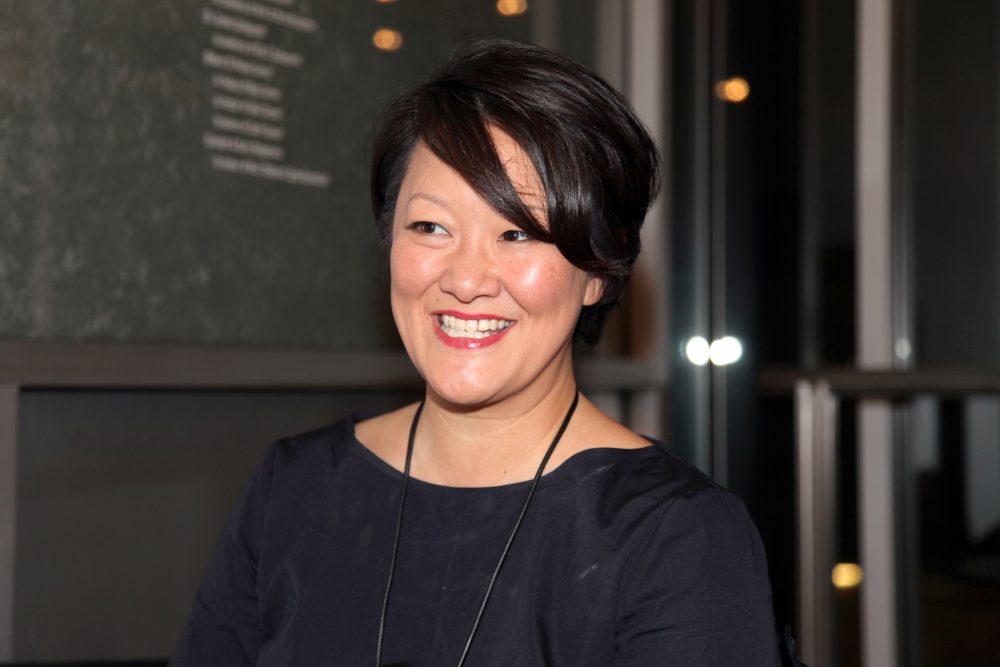
Photo by Aaron Salcido.
Jean H. Lee is a journalist and former Pyongyang Bureau Chief for the Associated Press. Both her parents were born in South Korea and immigrated as students to the United States in the 1960s. Before moderating a Zócalo/UCLA panel discussion titled “Is War With North Korea Inevitable?” at the National Center for the Preservation of Democracy in downtown Los Angeles, she spoke in the green room about supermarket shopping in Pyongyang and whether North Koreans have horns.
How often have you visited North Korea?
I’ve been there dozens of times, starting in 2008.
During that time, what has struck you most about what has changed and what has stayed the same?
Because I’ve been going over a nine-year period, I actually span the Kim Jong Il era and the Kim Jong Un era. One of the biggest things I’ve seen change is telecommunications, cellphones. Around the time that I started going is when we started seeing cell phones. An Egyptian telecommunications company, Orascom, went in and built a 3G network for the North Koreans. In 2009 they were using cellphones the way we were using cellphones in the 1990s: It was still very much a luxury item. In North Korea they have a divided network, so locals can call other North Koreans but they can’t phone foreigners and they can’t phone outside the country. That said, as the network expanded it gave North Koreans [the ability] to call one another in different parts of the country, and to share and exchange information. That was a new concept for the North Koreans, and very powerful.
What else?
Kim Jong Il, the late North Korean leader, one of the things he did before he died was go to China to learn about their supermarkets. So North Korea built a supermarket with Chinese money, it was a joint venture, in Pyongyang. So I wrote a story about what it meant to the North Korean people to have a supermarket for the first time. All of the products were imported from China, but they had Pabst Blue Ribbon beer, peanut butter, Spanish olive oil—all kinds of foreign goods that the North Koreans had never seen. They were manufactured for the Chinese market, and then exported to North Korea. The Pabst was a familiar blue and red can, but with Chinese characters on it. And also they didn’t know how to shop. They hadn’t had this experience of items on a shelf that you could pick from; they were used to going to the counter and getting what was given to them. So it was a whole new world. And when I went back last May, I went to the department store, and there was a new food court, which is mind-blowing because there’s a food shortage in North Korea. The elites are learning how to shop and eat and dine, the way we do in the rest of the world. There is a huge difference between the haves and have-nots.
Here in the United States, Kim Jong Un is usually depicted as a kind of comic-opera character, very satirically. How is he seen in Seoul, where you live?
The image is a little bit different than it is in the U.S. One thing is that South Korea has a very strict national security law, which prohibits South Koreans from accessing information about North Korea. The younger generation is completely oblivious to North Korea.
Do North Koreans know more about South Koreans than vice versa? Or are they both ignorant of one another?
I would say they’re fairly ignorant in some ways. I think those security laws have created a kind of willful cluelessness about North Korea. So they don’t necessarily have the caricatures that we have here, but they also don’t know very much about North Koreans. Older South Koreans, say 35 and older, grew up with this propaganda that North Koreans had horns. One of my friends, who’s in his 40s, said to me that he’d love to travel to North Korea because he was so curious about whether they have horns! And he meant it as a joke. But I think the caricatures are dangerous because they create this kind of distance where we don’t think of them as real people.
Do your parents talk about the Korean War?
It’s only recently that they’ve begun to talk about the war. South Koreans, one of the great things about them is that they’re such survivors. They moved on as quickly as they could, and they rebuilt that country and made prosperous lives for themselves. But they didn’t actually take the time to reflect and think about the pain and the suffering of the past. So in some sense it’s still with them. It’s only now that they’re retired that they’re starting to think about that. I would like to write about this a bit more. I would like to take my father to the place where he spent the war and write a family history. But it was the first time that I’d ever asked him what it was like. So I learned that he walked from Seoul to a town that took him days to get there, after Seoul was bombed. And then I found out that he watched one of his brothers die at one of these houses where they stayed. I was a little ashamed that I’d never asked, but I think I knew that he wouldn’t have been ready to talk about it. Until now.
What’s most Korean about you?
I grew up going to Korean school, I grew up doing Korean dance, so my heritage was part of my upbringing. But I don’t think of myself as very Korean, actually. I don’t even like kimchi.



